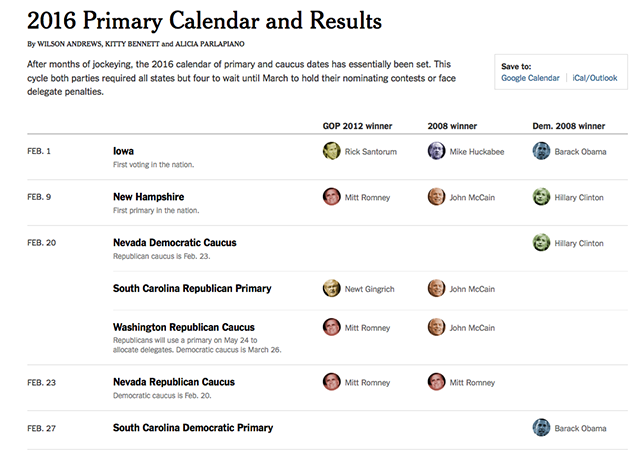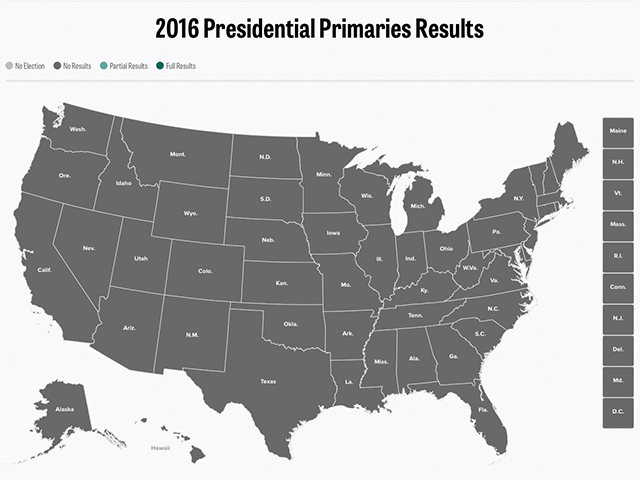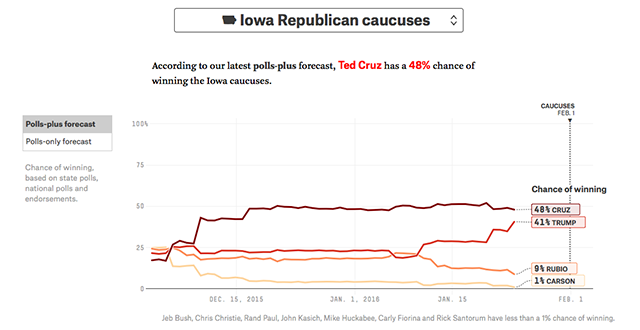

Have you ever wondered why the United States Presidential primaries are in the news for so long, even in other countries? After all, you rarely hear about political parties in other nations picking their leaders.
Part of the answer is obvious: the US is the most powerful country on the planet, and as such their election results matter almost everywhere. But another reason is that the US primary system seems designed to maximize drama. Instead of picking party leadership at a national convention, or even with a single-day vote, the process is drawn out in state-by-state elections than begin in the winter and don’t end until mid-summer.
Basically, the system is designed for drama in a way no other country can match – and the international press adores covering drama. If you want a quick tutorial about how the US Primary system works, this CGP Grey video is a great place to start. Watch it now.
Got it? It’s complicated, and a few things have changed since 2012 when the video was made, but it’s not a bad starting point. Now let’s go over a few sites that help you know who is voting when, who won where, and even learn who is likely to win.
The most basic question you might have is when the primary in your state happens. The New York Times offers a great single-page calendar outlining which primaries are when, also mentioning who won particular states in 2008 and 2012.

Whatever your opinion on the New York Times may be, this is a clean page that lists which primaries are when. Even better: you can add this to an online calendar. There’s an iCal link for Apple and Outlook users, and a one-click link for Google Calendar (this is another awesome thing you can add to Google Calendar.) If a primary is happening, you’ll know.
It’s one thing to know which primaries are coming up, but what about the ones that already happened? If you’re a fan of fascinating maps, make sure to bookmark Politico’s primary results map. You’ll see a map of the US with results filled in as the primary season goes on.

As of this writing, of course, none of the primaries have happened yet – hence the map is blank. But as the election season moves on, this will be an interesting way to put results into context.
If you can’t wait for results, you might be tempted by polls. But polls have famously diverging numbers, making them hard to make sense of. FiveThirtyEight made a name for itself in 2012, when it accurately predicted a wide array of results that the rest of the media had botched. They did this by averaging all the various polls out there while trying to correct for inconsistencies using other data points.

This year their Primary Forecasts page is already up and running. No one can predict human behavior with certainty – we’re way too complicated for that – but FiveThirtyEight has a better track record than most. Read Nate Silver’s explanation of how their predictions are calculated if you’re a math geek, or even if you’re just curious.
If you’re the sort of person who learns more quickly by interacting with a system than observing it. The Political Machine might be worth checking out. This game lets you go through the primary and general election process as any candidate you like.
It’s not exactly an education tool: it’s a game first and foremost. A lot of what you do is going to be inaccurate. But if you want a more tactile sense of what’s involved, it might be worth a spin.
If you want a comprehensive understanding of how the US political system works, beyond just the primaries, check out Crash Course Government and Politics. The course is designed to help high school students taking the AP United States Government and Politics class, but host Craig Benzine is so engaging that I’d recommend this series to anyone looking for an overview.
We’ve recommended Crash Course’s History and Biology videos in the past, and their US Government and Politics course is just as informative and fascinating. Check it out.
One caveat: do not watch these videos if you find senseless violence against plastic eagles disturbing.
I’ve tried my best to point to non-partisan resources that state the facts. But I’m wondering what I’ve missed. Can you think of any other resources? Maybe fact checking sites? Let’s compile anything we can think of in the comments below.
And while we’re talking about the election, remember: political campaigns are watching you on Facebook. Creepy, right?




 Dark Souls 2 Advanced PvP Techniques
Dark Souls 2 Advanced PvP Techniques Transformers: Dark of the Moon Walkthrough
Transformers: Dark of the Moon Walkthrough From Dust Review Round-Up
From Dust Review Round-Up Here's How To Do The Fusion Core Glitch In Fallout 4 After Patch 1.02
Here's How To Do The Fusion Core Glitch In Fallout 4 After Patch 1.02 GTA V PC Guide On Introduction To The Rockstar Editor, Everything You Need To Know
GTA V PC Guide On Introduction To The Rockstar Editor, Everything You Need To Know